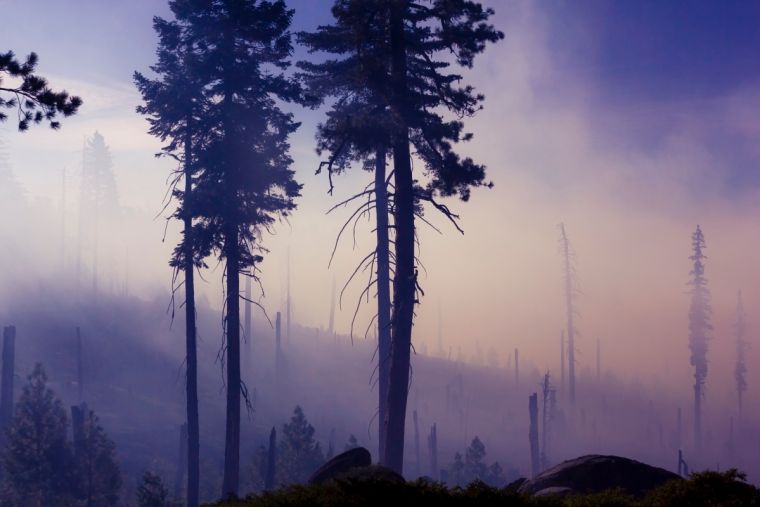Why Christians cannot afford to bury their talents in the fight against climate change

We are all familiar with the Parable of the Talents. Before leaving on his travels, a master gives each of his three servants different amounts of money to care for in his absence. While the first two servants invest their money and increase their master's wealth, the third servant lazily buries his share and is chastised by his master.
Money that is sensibly invested in noble causes rather than buried in the ground can have a tremendous positive impact on our world. We have a moral duty to invest in solutions to burning problems. When it comes to climate change, it just so happens that the solutions can also have a positive impact on our wealth – and ignoring them could put our investments at great risk.
The apathy of certain politicians towards climate change can sometimes give the impression that global warming is an extremely obscure phenomenon with no clear-cut answers. While we still have a lot to learn about climate change and our scientific models are constantly being refined, the overwhelming majority of climate scientists agree that our world as a whole is warming to dangerous levels and that we humans are the main contributors to this through our burning of fossil fuels such as coal, oil and gas.
Climate change is already leading to loss of life, property and arable farmland in many parts of the world. In February alone, we have seen climate change devastating parts of Africa through drought and causing unbearably hot temperatures in Australia.
While climate change will impact everyone – including investors in fossil fuel companies whose business models are increasingly unviable, or insurance companies who will have to raise premiums to cover the cost of increased claims – it is of course the poorest – the African farmer forced to move to new land because of drought, or the Filipino villager whose home is destroyed in flooding – who will be hit hardest. This is one of the injustices Pope Francis decries in his 2015 Encyclical Laudato Si'.
When considering the brutal impacts of climate change, we must also consider the solutions and be prepared to invest in them. It not only makes moral but also economic sense today to switch from combustion to electric cars and from fossil fuels to renewables. Just taking the example of a Ford Focus with automatic gearshift and a Nissan Leaf, one may cost Euro 20,000 today and the other Euro 24,000. However, if one drives just 50km per day, the Nissan Leaf saves Euro 1000/year compared to the Ford Focus, so that it becomes cheaper to own after four years. This is just one example of many.
We are in the middle of what is no less than a green industrial revolution. The price of solar power units and electric cars has plummeted over time, for example, with the levelised cost of solar energy having dropped by a factor of 100 since it was first invented and a factor of 10 in the last 10 years. Today, solar power in Berlin costs just Euro 6cent/kWh, or $3cent/kWh in Austin Texas. Oil would have to drop to $5/Barrel to be able to compete, while few oil companies can lift oil for less than $15/Barrel, such that any investment into new exploration is economic nonsense. Electric cars use a third of the energy of combustion engine cars and entail one third of the maintenance cost as they have fewer moving parts.
These technologies are already extremely competitive with their fossil fuel alternatives, and will soon completely outcompete them. This will wipe out many sectors and investments now considered safe as the 'carbon bubble' – the fossil fuel-related companies whose share prices are grossly overinflated when one considers their decreasing economic competitiveness – bursts. The value of currently expected revenue from oil, gas and coal companies that cannot be realised if we want to slow climate change – and also because renewables and electric transport will simply reduce demand and prices for fossil fuels – exceeds $23 trillion, which is already 50 per cent more than the amount of mortgage debt write-off that caused the 2008 financial crisis.
Catholic and other faith institutions, pension funds, insurance companies and private investors therefore have a moral duty as well as a strong financial incentive for themselves to divest from fossil fuels and to invest in renewables and resource efficiency. But in fact, we each should profess our dream of a sustainable, peaceful, decentrally powered and thus also more just and more democratic future and ensure that all of our personal investments – be they our health or fire insurance, our pensions or small amounts on private bank accounts – are used to make a difference.
Just as we shifted in many parts of the world from feudalism to civil society, it is time to move to civil capitalism, where the ultimate owner of most of the world's financial assets – the people – insist that no investment is made without an understanding of their environmental impact and that the people are given a choice between those that destroy their future and those that don't. Anyone can demand that the investment vehicles that handle their money invest it in a way compliant with the vision set out in Laudato Si', such as banks offering 'green' deposit or checking accounts. In times like these, we have no excuses for burying the gifts we have been given.
Jochen Wermuth is Chief Investment Officer at Wermuth Asset Management (WAM), an investment advisory firm whose aim is to generate significant returns and have a positive impact on the world. Find him on Twitter @WermuthJochen.











